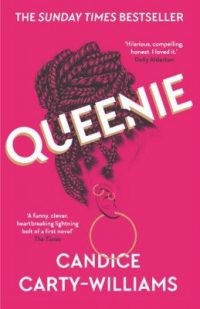I should have known that someone would come along and spoil it
 Queenie
Queenie
by Candice Carty-Williams
I loved this novel. It starts out riotously funny and gradually introduces its themes until it becomes clear that it’s talking about some very serious shit. But it remains extremely enjoyably readable to the end. Which is saying something right now, as having a puppy is very distracting.
We meet Queenie texting her boyfriend Tom from the stirrups of a gynaecologist’s table, while she waits for a series of nurses and doctors to come and take a look. Through the rest of the day, between her aunt Maggie’s ceaseless chatter and her quiet evening at home, we learn that all is not rosy between Queenie and Tom. But the reasons for that take a while to emerge because they are filtered through Queenie blaming herself and idolising Tom for “putting up with” her. While she is frank about some things in her life (sex, mostly) she is less open on other matters.
“ ‘I’ve read that.’
‘Huh?’ I looked up at the stranger who had sat right next to me on Clapham Common, despite the unlimited grass that surrounded us. I was trying out this whole ‘being outside in the summer’ thing that people seemed to like so much. It was mainly fine apart from the insects. I should have known that someone would come along and spoil it.”
All is not rosy for her at work either. Queenie compiles listings for a London magazine, where she has worked now for three years. She dearly wants to write proper articles but somehow seems to spend half her time at work gossiping with her friend Darcy and delegating her work to an intern. However, again there is more to this than is initially clear. Her boss Gina berates her for never showing interest in developing herself further, for never taking on anything new, but this appears to be gaslighting, as Queenie is regularly pitching articles about police brutality, Black Lives Matter and left-wing racism that Gina rejects.
Gina isn’t the only one gaslighting Queenie. Flashbacks to scenes with Tom show his family being racist and Tom berating Queenie for making a big deal about it. He also attacks her for flinching at physical contact without ever questioning why someone – especially a woman – might react that way.
Racism is a major theme – as Queenie points out at one point, she has no choice but to think about race all the time, as a black woman in London, while her white friends and colleagues can discard the topic when they’re bored by it. There are some beautiful sections where she compares her Caribbean heritage with her friend Kyazike’s African background – the world may see them as the same because of their skin colour but their families and outlook are very different.
“We went to slide our way inside and were stopped by a drunk girl with short pink hair who reached out and ran her hands through my twists like they weren’t attached to my scalp…
‘What the fuck do you think you’re doing?’ Kyazike said, grabbing the girl by the wrist and pushing her hand away. ‘You can’t do that!’
‘Oh my god,’ the girl whimpered, clutching her wrist…A bouncer with dyed red hair that matched a tight T-shirt straining over his muscles appeared suddenly from the darkness and put each of his giant hands on mine and Kyazike’s shoulders…
‘Right, you two, you’ll have to leave’…
‘We’re leaving your shit club anyway,’ Kyazike told him. ‘But if you like your clientele reaching out to touch black people like we’re animals in a petting zoo, then fair play, innit.’
[On the way home] I made an internal list of people who could touch my hair.
1. Me
2. A hairdresser
3. That’s it, that’s the whole list.”
Friendship and family are central as well. Queenie evades her family when she can, but ultimately they (primarily her grandmother) are there for her when times get tough. Queenie prefers to turn to her friends but as she is hiding some significant secrets from them, they don’t understand her increasingly erratic behaviour.
I should probably give a content warning here – this novel deals with abuse in many forms. While often humorous or sweet, there are also passages that are tough to read. I think Carty-Williams hits just the right balance overall, but for readers who have their own trauma it might be harder to get through. I think it is admirable to write a funny, sexually explicit novel about young women that acknowledges that some people in their 20s are going through a hard time, often despite appearances.
Queenie is a fascinating, flawed and troubled, likeable narrator and I really enjoyed her company for the week I was reading this. My only criticism is that there was some weird inconsistency with tenses that threw me (I wonder if it was originally written in present tense aside from flashbacks, and that was changed in the editing process but they missed a bunch of places?). I very much want to read what Carty-Williams writes next.
Published 2019 by Trapeze.
Source: Storysmith Books, Bristol.